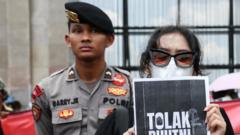On a pivotal day in Indonesia's democracy, significant changes passed by the parliament have allowed military personnel to take on governmental roles while still in active service, stirring memories of the authoritarian rule under former president Suharto. Demonstrators have gathered outside parliament, with many fearing a reversal of democratic progress since Suharto's fall in 1998. Critics, including pro-democracy activists, have voiced concerns over the potential return to a militarized government, emphasizing the importance of civilian governance free from military interference.
Military's Expanded Role in Indonesian Governance Sparks Nationwide Protests

Military's Expanded Role in Indonesian Governance Sparks Nationwide Protests
Indonesia's recent legislative changes permitting greater military involvement in government have ignited widespread public outrage and protests against potential authoritarianism.
Activist Wilson from KontraS firmly noted that such legislative revisions mark a severe blow to democracy, as the military should focus solely on national defense functions. With military involvement in 14 civilian sectors now authorized, tensions are rising.
The opposition party's endorsement of these provisions, amidst growing protests, highlights the evolving political landscape under President Prabowo Subianto, whose military connections evoke wariness in the population based on his historical ties to human rights abuses. Critics argue that an armed forces' presence in civilian institutions jeopardizes autonomy and accountability, raising alarm over implications for justice and civil liberties.
Protests continue relentlessly, as activists vow to resist, emphasizing their commitment to safeguarding democracy.
Since taking office, President Prabowo has significantly increased military functions in civil domains, drawing skepticism about his intentions and the direction of governance. As defense minister Sjafrie Sjamsoeddin defended the amendments citing global necessities, rights groups firmly disagree, warning of risks to impartiality and governance integrity. The struggle for democracy in Indonesia, once again challenged, faces an uncertain future as activists continue to rally for their rights.
The opposition party's endorsement of these provisions, amidst growing protests, highlights the evolving political landscape under President Prabowo Subianto, whose military connections evoke wariness in the population based on his historical ties to human rights abuses. Critics argue that an armed forces' presence in civilian institutions jeopardizes autonomy and accountability, raising alarm over implications for justice and civil liberties.
Protests continue relentlessly, as activists vow to resist, emphasizing their commitment to safeguarding democracy.
Since taking office, President Prabowo has significantly increased military functions in civil domains, drawing skepticism about his intentions and the direction of governance. As defense minister Sjafrie Sjamsoeddin defended the amendments citing global necessities, rights groups firmly disagree, warning of risks to impartiality and governance integrity. The struggle for democracy in Indonesia, once again challenged, faces an uncertain future as activists continue to rally for their rights.























